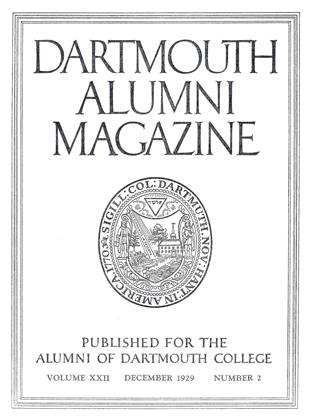Commencement later than at present and ending on Thursday was a test of endurance with much serious public speaking. Think of it: The Baccalaureate Sunday evening address to the uppermost religious organization, prize speaking, address to the literary societies or to the alumni, the great day with its twenty-four orators and the alumni dinner. The faculty had small salaries, but they were hospitable to visitors who had no place to go if the hotel was full. The graduating exercises were about two hours shorter than the Passion Play at Oberammergau but without its restful intermission at noon. But visitors could steal away from the freshet of wisdom to noble lunches in faculty houses. The south end of the Green like the adjunct to a country circus was cluttered with booths and peanut stands, pink lemonade and three throws for a dime.
Immediately after Commencement a group from the graduating class or from the new seniors organized a walking party to the White Mountains taking a bat or two in order to play any nine to be found on the way and a wagon to carry the baggage.
One interesting custom must not be forgotten. In the fall—and that suggests apples—the sophomores went forth in divisions of eight or ten for required field work in surveying. These were days of abundant fun and not wholly without benefit to the high boys who were director and register of their divisions and allowed to do all the work while the low boys foraged and rested.
One more very important peculiarity of the time which was the occasion of many differences from the present situation was the existence of The Chandler School of Science and the Arts as a wholly separate institution in terms of admission, curriculum, administration, fraternities. This was completely merged into the courses of Dartmouth College in the nineties much to the advantage of all.
It is not within the scope of this article to advertise present advantages lacking at the period to which I refer. The unfurnished condition was not peculiar to our college. But merely for illustration—the College had no auditorium, athletic equipment, conveniences for hospitality at Commencement or other times, messengers from the outside world to the various departments, student laboratories, officers of administration, rest years for the professors; and the differences in curriculum can only be grasped by comparative study of the catalogues of 1868 and 1928 or others of about the same years.
The present generation thinks of those ancients as unfortunately inferior in not having the advantages and privileges of today. But not so; they missed no advantages of which they were unaware. What if they couldn't drive a motor car? Life was just as full of reality and zest. They made lifelong friendships. They used their time as well as the generation of today, though differently. They went out able to do their full share in the developing years to come. A study of the brief record in the General Catalogue of the four classes 1869-1872 would be illuminating to those who doubt.
A TRACK TEAM The home in the background is only scenery but the young men are quite genuine. Does anyone know who they are?
 View Full Issue
View Full Issue
More From This Issue
-
 Class Notes
Class NotesCLASS OF 1923
December 1929 By Truman T. Metzel -
 Article
ArticleAlumni Associations
December 1929 -
 Article
ArticleAlumni Council Meets in New York
December 1929 -
 Article
ArticleCarnegie Report
December 1929 -
 Article
ArticleThe Dartmouth Indians
December 1929 By Eric P. Kelly -
 Sports
SportsThe Yale Epic
December 1929 By Phil Sherman
Professor Edwin J. Bartlett
-
 Article
ArticleTHIS HANOVER
JUNE, 1928 By Professor Edwin J. Bartlett -
 Article
ArticleTHE GENERAL ASPECT
DECEMBER 1929 By Professor Edwin J. Bartlett -
 Article
ArticleA FRESHMAN'S EXPERIENCE
DECEMBER 1929 By Professor Edwin J. Bartlett -
 Article
ArticleDECLINE OF THE HANDEL SOCIETY
DECEMBER 1929 By Professor Edwin J. Bartlett -
 Article
ArticleLECTURES WERE RARE
DECEMBER 1929 By Professor Edwin J. Bartlett -
 Article
ArticleEACH STUDENT HAD A STOVE
DECEMBER 1929 By Professor Edwin J. Bartlett








